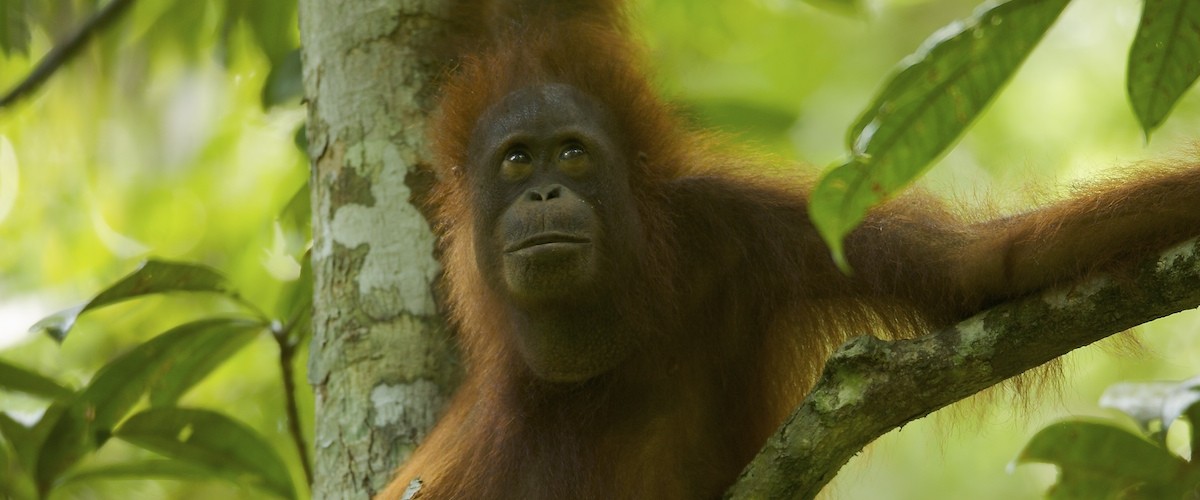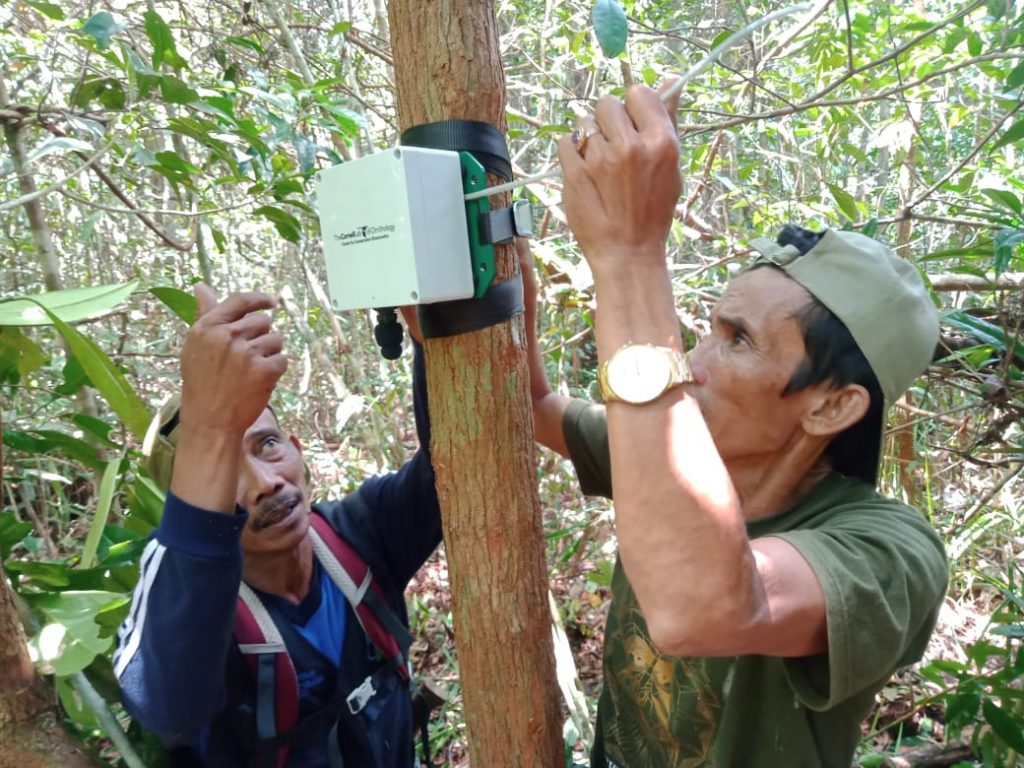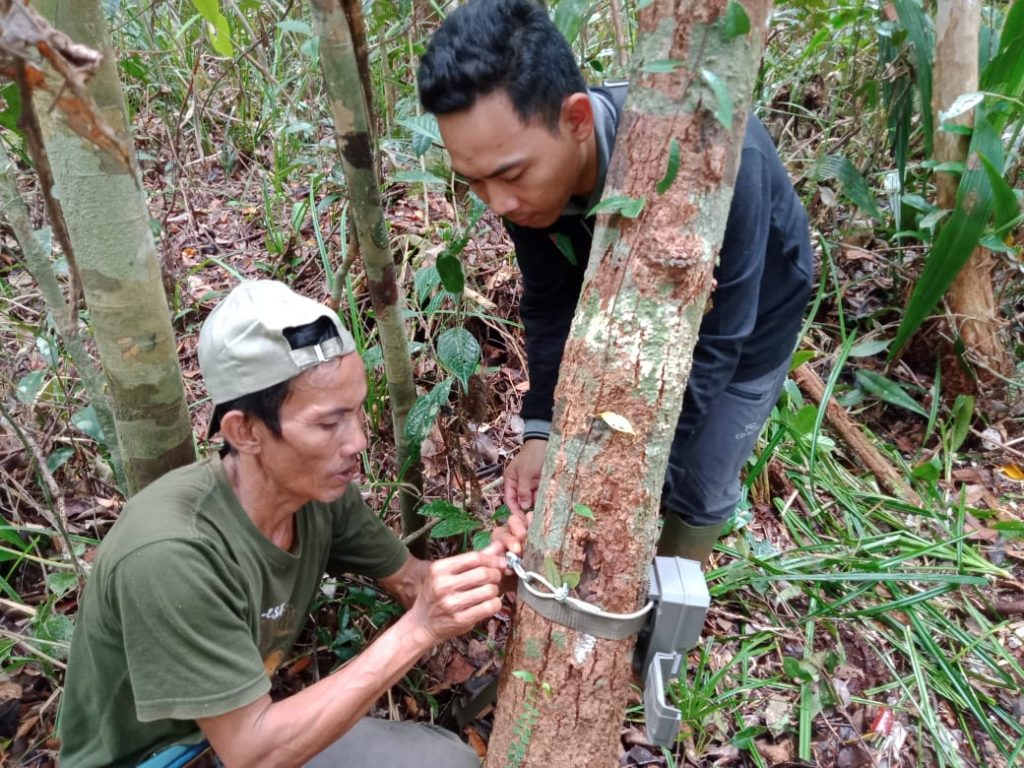By Natalie Robinson, Program Coordinator & Cheryl Knott, Executive Director
As 2022 comes to an end, we have a new beginning. “Berani”, the orangutan, has had her first baby! Berani is an adolescent female orangutan that our team has known since 2008, when she was first found with her mother, Bibi. By 2013, Berani had become independent from her mother, and in 2015 Berani’s younger brother, Bayas, was born. Our research team had been tracking Berani’s pregnancy since the summer. We first suspected she was pregnant, in June 2022, but were unable to get definitive results. By August, when we tested her urine again, the pregnancy test came back with a clear result – positive! When the team found her again on December 11th, Berani had a tiny new infant, who we estimated to be just a few weeks old. We are excited to keep a close watch on this first member of the next generation of the Bibi family!
Milestones like these remind us how incredible and rewarding long-term research projects are. It is thanks to continued support from Indonesian counterparts and sponsors, as well as an international base of supporters and donors, that we are able to continue this important research!

As we close out the year, we have been reflecting on the many accomplishments of 2022. Our team has worked tirelessly each day to study and conserve the wild orangutans across the Gunung Palung National Park landscape. Here, we highlight some of our main achievements.
We started off the year with our 2022 Annual Meeting in January, on Pulau Juante in Sukadana. Staff from the conservation and research teams came together on this beautiful island to share the accomplishments of the previous year and discuss plans and goals for the coming year.
In February, we finished construction of the new satellite camp at the Rangkong River research area, where we are now able to house a full-time team of researchers who are collecting scientific data in order to understand the ways in which wild orangutans use this degraded and regenerating habitat, and how this may impact their behavior, health, diet and physiology.
Later that month we held the inauguration of the 11th cohort of REBONK youth group members, who continued to help plan and organize outreach activities for the community throughout the year.
In March, we had a special visit from our long-time research counterpart and supporter, Dr. Sri Suci Utami Atmoko (Ibu Suci). Ibu Suci, who also serves on the Yayasan Palung Governing Board, visited Cabang Panti Research Station for the first time in nearly two decades!
We held a workshop on the production of liquid smoke and organic fertilizer for members of the Padu Banjar and Pulau Kumbang villages. The use of these methods helps to prevent forest and land fires, while also fertilizing crops and providing an alternative source of income for the community.
GPOCP/YP Executive Director, Dr. Cheryl Knott, also co-authored two publications on measuring the effectiveness of 20 years of orangutan conservation (contributing 20+ years of longitudinal data from Gunung Palung) and about sociality and orangutan vocal phenotypes.
We celebrated Earth Day in April, and then welcomed our new Environmental Education Manager, Widiya.
In May, we were thrilled to see wild orangutan “Tari” with a new baby, later given the name “Tara”. For this critically endangered species, every baby is a cause for celebration!
In June, we held the annual West Bornean Orangutan Caring Scholarship (WBOCS) Award Ceremony to celebrate the new cohort of scholarship recipients, who have since begun their undergraduate studies at Tanjungpura University in Pontianak.

Later that month we celebrated World Rainforest Day, and were excited to provide full sets of firefighting equipment to 5 Hutan Desa and the village of Tanjung Gunung, which borders the National Park. We also held trainings on fighting forest and land fires, and introduced representatives from each village to all the equipment and how to properly maintain it.
Members from each of the 7 Hutan Desa also continued to sustainably manage their land through annual biodiversity surveys and monthly SMART patrols.
July was a very busy month because foreigners were able to return to Ketapang and Gunung Palung for the first time since 2019! Dr. Cheryl Knott and her family, along with Natalie Robinson and four Boston University students, ventured to West Kalimantan, where we visited with staff who have been on the ground since the onset of the COVID-19 pandemic. We spent a few days in Jakarta on the way, where Dr. Knott presented at the Women and Primatology Symposium hosted by Universitas Nasional.
We then spent the rest of summer visiting the newly rebuilt Cabang Panti Research Station, the new Rangkong satellite camp, Customary Forests, the Bentangor Environmental Education Center, Sustainable Livelihoods groups throughout the Kayong Utara Regency, and more! The team carried out trainings and introduced some exciting new research tools such as thermal drones and an expanded use of bioacoustic monitors and camera traps.

Also in July, Dr. Knott along with her former graduate student, Dr. Lara Durgavich, and current student Faye Harwell, published the first composite menstrual cycle for orangutans.
In August, we learned that a wild orangutan, “Berani”, was pregnant with her first baby – a perfect way to further celebrate World Orangutan Day, which was observed on August 19th.
In September, our Research Manager, Rizal, and Field Research Assistants, Dang and Dika, continued the tradition of visiting local schools, in collaboration with our Environmental Education team. The Education team visits schools weekly, reaching nearly every school in the region over the course of a year. But lectures from special guests like Dang, Dika and Rizal, while they are out of the forest, are always an exciting treat. Students love to hear stories about their first-hand experiences studying wild orangutans in Gunung Palung National Park!
In October, we were excited to announce a new publication in the American Journal of Primatology about using parallel laser photogrammetry to measure growth in wild orangutans. Former Research Manager Ella Brown was the lead author on this paper. Our preliminary results, using this method, show that male flange width and forearm length don’t reliably increase in tandem, and female growth plateaus around age 15, the mean age at first birth.
Also in October, we hosted the first ecoprint workshop for Sustainable Livelihood artisans, led by Chatarina Kusumawardhani. Ibu Chatarina taught the group of women two different methods to create these beautiful cloths and shirts, dyed with pigments from locally sourced leaves and flowers. This neat innovation has been taught in various regions around Indonesia, and we are so excited that women from our community are now empowered to add this to their repertoire of crafts to sell as a source of forest-friendly income!
In November, we celebrated Orangutan Caring Week. This year we went all out, holding a multi-day festival for the community, and hosting a variety of special guests, including the Bupati (Regent) of Kayong Utara.
We were also proud to have two GPOCP/YP staff present their work at the 8th Asian Primate Symposium, held in Hanoi, Vietnam. We rounded out the month with Giving Tuesday, and felt especially grateful for all of our supporters.
That brings us back to this month, December, when we published another paper about orangutans leaving available fruit for non-fruit foods. GPOCP/YP research alumna, Dr. Andrea DiGiorgio, was the first author on this paper, which uses data collected from Gunung Palung during her dissertation field research.
Throughout the year, we continued to host counterpart students at Cabang Panti Research Station, where our research team spent more than 3,400 hours following wild orangutans.
We are so grateful for everyone’s hard work and optimistic that the next year will bring even more successes!


Management of Cabang Panti Research Station is conducted by the Gunung Palung National Park Office (BTN-GP) in collaboration with GPOCP/YP. Scientific research is carried out in conjunction with the Universitas Nasional (UNAS) and Boston University.








